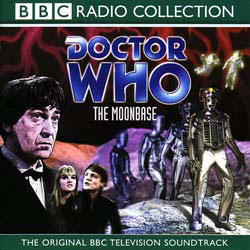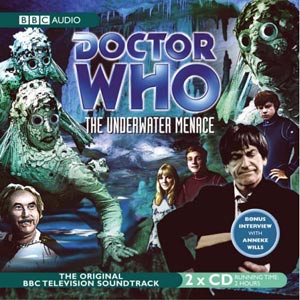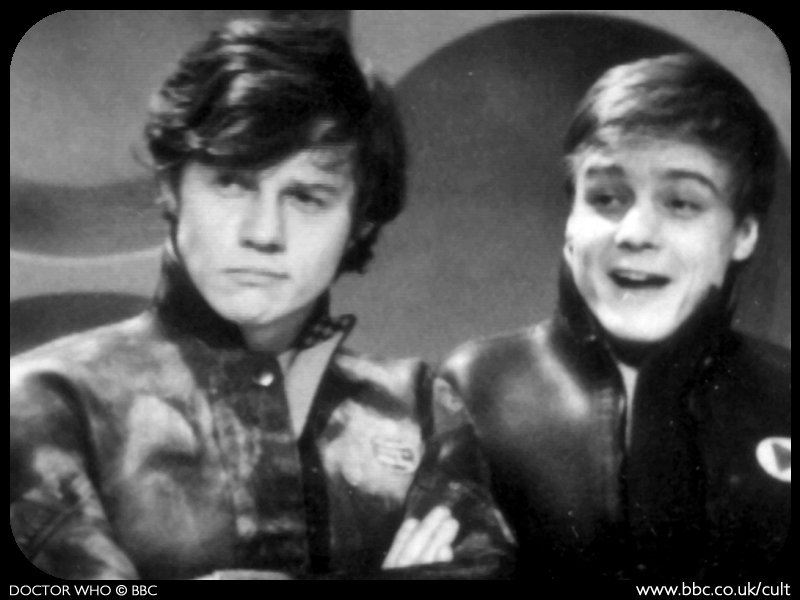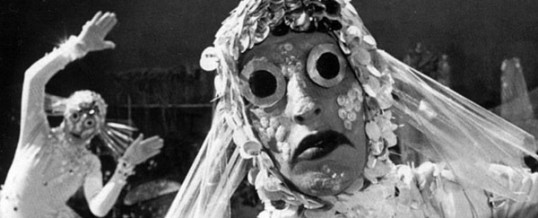The Macra Terror introduces
the ‘terrifying’ eponymous creatures, who since have briefly appeared in the
revived series – in an appearance utterly redundant to the plot, mind – and sees
the time travellers arrive within a seemingly utopian society, run much like a
1950s holiday camp. If The Moonbase was a serial for Anneke
Wills to really expand on her character, then The Macra Terror does the same for Michael Craze’s character Ben. The Macra Terror is also the very first serial to feature the Doctor's face in the opening credits - again, it a shame we don't get to see this is in action until the first episode of the next serial, which at least exists.
 The colony is a suspicious place, and from the telesnaps we
can tell that the visuals are superb – the set and costume design is
marvellous, and the use of the incidental music, whilst mildly jarring, fits
wonderfully with the setting – it is cheery, upbeat, and so fits the jovial
atmosphere perfectly. The first thing
welcoming the Doctor and his crew is the distraught Medok, played with
bleary-eyed enthusiasm by Terence Lodge.
Medok is being pursued by Ola and the guards, and thanks to the
distraction of the new arrivals he is captured for reprogramming in the
correctional facility – “for your own good”.
It is the first of many clues that not all is well in this colony –
despite the cheerful facade and fun and frivolity, something is decidedly wrong
here.
The colony is a suspicious place, and from the telesnaps we
can tell that the visuals are superb – the set and costume design is
marvellous, and the use of the incidental music, whilst mildly jarring, fits
wonderfully with the setting – it is cheery, upbeat, and so fits the jovial
atmosphere perfectly. The first thing
welcoming the Doctor and his crew is the distraught Medok, played with
bleary-eyed enthusiasm by Terence Lodge.
Medok is being pursued by Ola and the guards, and thanks to the
distraction of the new arrivals he is captured for reprogramming in the
correctional facility – “for your own good”.
It is the first of many clues that not all is well in this colony –
despite the cheerful facade and fun and frivolity, something is decidedly wrong
here.
The colony operates as a perfect utopia, where all involved
are happy to work – for work helps the colony, so all can be happy. This idyll is overseen by Ola, the chief of
the security forces here, and the Pilot.
Both are overseen by the Controller, an Orwellian leader in the vein of
Big Brother. Upon arrival within the
colony, where they are welcomed and heralded for their assistance in the
capture of the rebellious Medok, the group are taken to the ‘Refreshment Area’,
where they are provided with fresh clothes and a rejuvenated appearance. There is a nifty continuity bit here, though,
with Anneke Wills’ haircut being hidden with hair extensions until this opening
episode. The Doctor, however, is far
less pleased with his new spick-and-span appearance, and there is some
wonderful comedy when he steps into the “rough and tumble” machine to return to
his previous appearance.
 Fraser Hines, as Jamie, is given some wonderful
characterisation in the serial, too, as he is naturally predisposed to judging
the seemingly perfect society, and his paranoia about the environment and the
people is played marvellously. The
dystopian theme is made blatant to the viewer, too; we, as do Jamie and the
Doctor, feel uncomfortable here, and it is predominantly thanks to the superb
script by Ian Stuart Black; the juxtaposition of the seeming idyllic lifestyle
with phrasing such as “It is a privilege to work!” and the decision that they
are to be “confined” for “happy sleep time”.
There is an underlying menace made through the clear emphasis placed on
certain words and phrases. Likewise,
after the travellers are confined to their beds, the Controller’s demands that
the guards go out to find the newly escaped Medok – again, thanks to the Doctor
– and Ola’s order that they “shoot to kill” further highlights the threat.
Fraser Hines, as Jamie, is given some wonderful
characterisation in the serial, too, as he is naturally predisposed to judging
the seemingly perfect society, and his paranoia about the environment and the
people is played marvellously. The
dystopian theme is made blatant to the viewer, too; we, as do Jamie and the
Doctor, feel uncomfortable here, and it is predominantly thanks to the superb
script by Ian Stuart Black; the juxtaposition of the seeming idyllic lifestyle
with phrasing such as “It is a privilege to work!” and the decision that they
are to be “confined” for “happy sleep time”.
There is an underlying menace made through the clear emphasis placed on
certain words and phrases. Likewise,
after the travellers are confined to their beds, the Controller’s demands that
the guards go out to find the newly escaped Medok – again, thanks to the Doctor
– and Ola’s order that they “shoot to kill” further highlights the threat.
Meanwhile, the Doctor has slipped from his confinement and
is searching the building areas for Medok, who he spotted hiding earlier
on. He is aware of the danger to the
colony, and needs desperately to speak to Medok to confirm his fears. The final moments of the episode see the
final reveal of the claw of the Macra – and this is where my only real issue
with this serial arises; after the cliffhanger at the end of The Moonbase, where the TARDIS crew saw
the claw appearing, almost an identical cliffhanger arises here at the end of
episode 1 – and indeed, a very similar cliffhanger is used at the end of
episode 2, but with Ben and Polly in danger, and episode 3 sees an identical
one again, this time on a TV screen in the room with the Controller.
Episode 2 sees the propaganda of the colony ratchet up even
further into darker realms with the subconscious and soothing voice muttering
empty promises and subliminal messages of the ‘deep sleep thinking’. As Ben, Jamie and Polly sleep in their rooms,
gas seeps in and the calming voice of Richard Beale tells them to “obey”, and
the way in which the two male companions react to it is fascinating; whilst
Jamie is unable to sleep, aware of the evil intentions of the calming voice, we
are forced to realise that, as he is from ‘the past’, he is close-minded. He cannot be controlled, and is slightly
unknowable, much like the Doctor himself.
Ben, meanwhile, has an institutionalised mind anyway, as he is from a
naval background which sees him spend his life following orders and acting
within the boundaries of the status quo.
It is natural, then, that the hypnotism works on him.
 And again, this is where Michael Craze is really able to
come into his own; everything about his portrayal of Ben changes with the
slightest nuances – his accent loses its broadness, his inflections alter ever
so slightly. Although we can’t see him
in action, as the episode is missing, from the stills available it looks like
he even holds himself differently. It’s
magnificent – his character growth continues in the next two episodes too, as
he tries to fight his ‘reprogramming’ and yet betrays his friends and
everything he previously held dear to him, but the change in his voice means we
are able to hear him desperately fighting it – he questions the frivolity of the
Doctor, and his antiestablishment message, and reports his friends for the
damage and refusal to follow the colony line, but we can hear how much it cuts
him up inside all the same.
And again, this is where Michael Craze is really able to
come into his own; everything about his portrayal of Ben changes with the
slightest nuances – his accent loses its broadness, his inflections alter ever
so slightly. Although we can’t see him
in action, as the episode is missing, from the stills available it looks like
he even holds himself differently. It’s
magnificent – his character growth continues in the next two episodes too, as
he tries to fight his ‘reprogramming’ and yet betrays his friends and
everything he previously held dear to him, but the change in his voice means we
are able to hear him desperately fighting it – he questions the frivolity of the
Doctor, and his antiestablishment message, and reports his friends for the
damage and refusal to follow the colony line, but we can hear how much it cuts
him up inside all the same.
Troughton’s on top form here, too – since his arrival, we
could tell that he was a rebel, and against the establishment. The
Macra Terror gives him the perfect platform to expound his own mantras – “bad
rules are made to be broken”, he says in episode 4, but it isn’t just rules he
looks to break. The genuine pleasure he
feels when he destroys the technology of the deep sleep thinking programming is
wonderful, and the fact that he impresses himself is beautifully played. The faith that the simply boy from the past
has in him is lovely, too – Hines plays Jamie as virtuous and faithful, and it
is no wonder that he went on to be the companion to Troughton’s Doctor for the
rest of his tenure; their relationship is cemented here, as he extols “I take
orders from no-one but the Doctor”.
The scenes in which Ben pursues Polly through the camp are
troubling – thanks to his hypnotic reprogramming, we can’t be sure exactly how
he’ll react once he catches here, but as the two become surrounded by the
Macra, Craze’s portrayal is superb; whilst Polly simply screams a lot, Ben
desperately fights his programming, which clearly states that “There are no
Macra!” but the evidence of his own eyes causes him huge concern. It’s a lovely moment, and one which is made
all the better by his decision to send Polly off, whilst he stays and fights to
keep her safe. Despite the control held
over him, he still cherishes her safety over that of his own.
 The final scenes, where Ben denies the existence of the
Macra despite the incidents in the building site are offset by the sudden
discovery that the Macra are in charge – whilst the audience have been able to
predict as much all along, particularly due to the Controller only ever being
visible as a photograph, with the Big Brother style liturgy being pumped out at
full blast, and the underlying menace of the ‘happy’ vocabulary, the reveal of
the frail old man, menaced over by a gigantic claw, is still rather
shocking.
The final scenes, where Ben denies the existence of the
Macra despite the incidents in the building site are offset by the sudden
discovery that the Macra are in charge – whilst the audience have been able to
predict as much all along, particularly due to the Controller only ever being
visible as a photograph, with the Big Brother style liturgy being pumped out at
full blast, and the underlying menace of the ‘happy’ vocabulary, the reveal of
the frail old man, menaced over by a gigantic claw, is still rather
shocking.
Episode 3 sees the Doctor and his companions sent to work on
“the Danger Gang”, down in the mines where people are sent to work until their
death when reprogramming proves an invalid form of control. There, they are reunited with Medok, and,
overseen by the Officia, played by John Harvey.
Harvey is wonderful – as with Peter Jeffrey as the Pilot, they represent
the real danger of this dystopian society, good men who do bad things because
they think it is right. The Officia
sends the group down into the gas mines, leaving the Doctor top-side in the
control room as their overseer. Jamie
and Polly are swiftly able to relieve the Officia of his keys, though, and
Jamie sneaks away with Medok into the Old Shaft, where it is prohibited for
colonists to enter. Sadly, Medok is
swiftly dispatched by a rampaging Macra claw, though, and Jamie is alone,
face-to-face with an apparently dormant creature.
Troughton is wonderful in his scenes with the chalk, as he
mentally decodes a system which the colony computers had taken years to work
out; there is no doubt that the Doctor is still the genius he seemed to be as
Hartnell, which makes him all the more unreliable, as a genius with no respect
for authority is a dangerous thing indeed.
The moment that he gives himself 10/10 for his workings and then,
gleefully, changes it to 11/10 when he discovers how difficult the workings
allegedly were, is hilarious.
 Despite his conditioning, Ben still helps his friends though
– having seen the Officia have his keys swiped, he does not report them. When questioned on this, he simply responds
that he doesn’t know why he didn’t report.
This scene echoes an almost identical one in Ian Stuart Black’s last
script, The War Machines, where it
was Polly who had been hypnotised, and allowed Ben’s escape. Craze, though, gets far more to do on an
emotional level – we can hear the confusion in his voice and it is tearing him
apart.
Despite his conditioning, Ben still helps his friends though
– having seen the Officia have his keys swiped, he does not report them. When questioned on this, he simply responds
that he doesn’t know why he didn’t report.
This scene echoes an almost identical one in Ian Stuart Black’s last
script, The War Machines, where it
was Polly who had been hypnotised, and allowed Ben’s escape. Craze, though, gets far more to do on an
emotional level – we can hear the confusion in his voice and it is tearing him
apart.
The Controller orders the gas to be diverted into the Old
Shaft, where Jamie is currently hiding, and it allows the Doctor to finally
realise the importance of the gas to the colonists – the Macra thrive on it; like
a bacteria, they are hiding beneath the surface, feeding on the gas to give
them the strength for their brief forays to the surface. As the gas is diverted, the slumbering giant
awakens and begins to terrorise Jamie, and it is a race against time for the
Doctor to save him. The cliffhanger
motif is repeated once more, as a gigantic claw looms over Jamie.
Episode 4 sees Troughton at his most rebellious and
dangerous – the glee that we can hear in his voice as he takes tremendous
pleasure in damaging the circuitry and rerouting gas is palpable, and the fury
of the colonists is marvellous too; they refuse to believe in the Macra, thanks
to their programming, and as such see no reason for this level of wanton
destruction. The Doctor’s meddling does,
of course, save Jamie, as he diverts the outflow and inflow pipes to pump
oxygen into the shaft, forcing the Macra to return to its weakened slumber. The Doctor’s attempts to persuade Polly that
there is no danger – “There’s no need to be afraid... at least, I think there’s no need...” is brilliant,
but again we’re given the idea that this Doctor, for all of his clear intellect
and cunning, is doing everything on a wing and a prayer. He’s always the man with the plan, now, but
there’s always a sense that the outcome is pure luck.
Jamie finally escapes the Old Shaft and runs straight into a
group of cheerleaders rehearsing for their rousing show that evening. The mantras of the society are never as
chilling as they are here, though, cried with exultant glee by skimpily dressed
colonists who genuinely believe in all that they are saying. His escape from them, under the guise of a
dancer, sounds like tremendous fun, and again, it is a travesty that this episode
is missing – likewise for the final scenes in which the TARDIS crew all dance
their way to freedom, it sounds marvellous.
The Doctor and Polly have discovered the truth, meanwhile,
having followed a system of pipes down to the Control Room, where a white Macra
presides, issuing orders over the sound system.
Miraculously, the Doctor manages to break the conditioning of the Pilot –
although quite how he manages it so quickly is beyond me, considering the
number of years he has no doubt been under the influence of it – and he
persuades the Pilot to follow him to see the truth of the Macra
infestation. The horror in Peter Jeffrey’s
voice sells his conviction wonderfully – we can fully believe that this is a
man who realises that almost his entire life has been a sham, and he has been
duped from the outset.
One of the most chilling things about this final episode,
though, is the voice of the control, played with chilling precision by Denis
Goacher. The previous calm is gradually distorted
as it realises exactly what Ben is doing – the childish pleas for help, the
very insistence that they stop doing
what they are doing because the Macra hasn’t commanded it, is horrifying. Finally able to see clearly, having broken his
conditioning once and for all, Ben aids the Doctor with transferring the gas
flows into the Control Centre, causing an explosion which kills the Macra –
amidst pleas such as “It is forbidden
to touch that instrument! You must not obey the Doctor! You will kill us all!
He intends to create an explosion!” an explosion rips the heart of the colony apart,
freeing all of the inhabitants there.
With the Macra
destroyed, the colony reverts to a celebratory mood – much like the opening
scenes, there is music and partying and fun, only this time it seems
genuine. Even the Doctor is getting
involved, for once hanging around for the thanks of the colonists. It is only when he is informed by Ben that “they’re
going to draft us as members of the Colony – and make you the next Pilot!” he
decides to take the group back to the comparative safety of the TARDIS, and
following Jamie’s lead, the group dance their way back to the ship.
 Whilst it is
difficult to say with absolute certainty, due to the missing nature of the
visuals, I would like to argue that The
Macra Terror is possibly one of the finest Doctor Who serials, certainly of
the 1960s if not ever. The script is
superb – the satire is perfectly well-handled by Ian Stuart Black – and the
performances from the guest cast are sublime, too. There is not one faulted performances
throughout, and Michael Craze and Troughton have rarely been on such top form
yet. The incidental music was sublime,
jarring and unnerving whilst being disgustingly saccharine at the same time, in
perfect keeping with the supposed idyll of the Colony. The set design, and costume design too, were uniformly
excellent, and although the appearance of the Macra may have let the serial
down in some regards, as how successfully achieved they are is unclear, the
director clearly had a talent for keeping things suitably dark and mysterious,
wreathed in fog, and one can only imagine how excellent this lost masterpiece
truly is.
Whilst it is
difficult to say with absolute certainty, due to the missing nature of the
visuals, I would like to argue that The
Macra Terror is possibly one of the finest Doctor Who serials, certainly of
the 1960s if not ever. The script is
superb – the satire is perfectly well-handled by Ian Stuart Black – and the
performances from the guest cast are sublime, too. There is not one faulted performances
throughout, and Michael Craze and Troughton have rarely been on such top form
yet. The incidental music was sublime,
jarring and unnerving whilst being disgustingly saccharine at the same time, in
perfect keeping with the supposed idyll of the Colony. The set design, and costume design too, were uniformly
excellent, and although the appearance of the Macra may have let the serial
down in some regards, as how successfully achieved they are is unclear, the
director clearly had a talent for keeping things suitably dark and mysterious,
wreathed in fog, and one can only imagine how excellent this lost masterpiece
truly is.



























